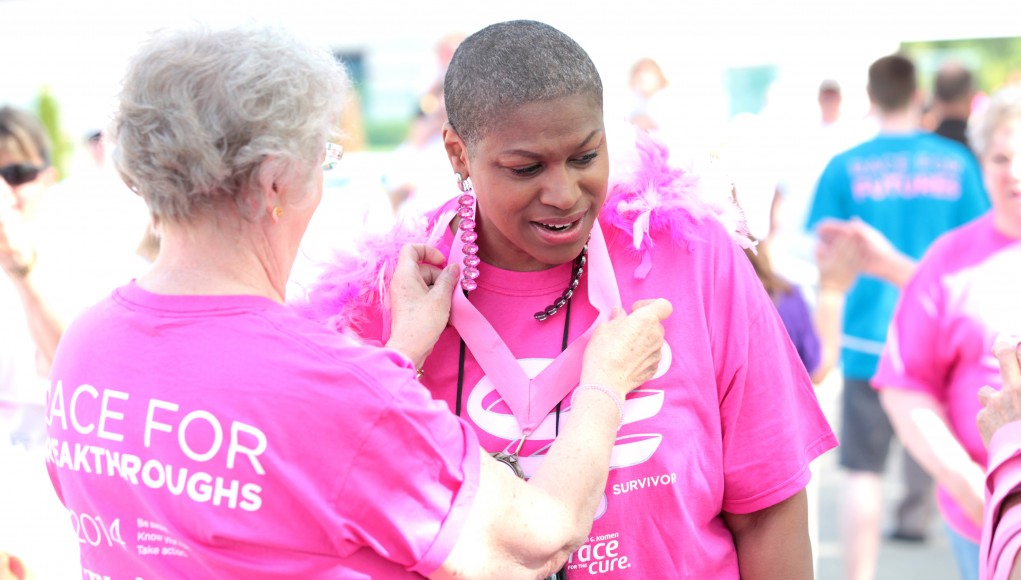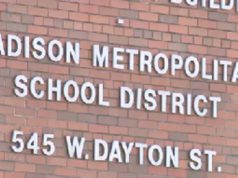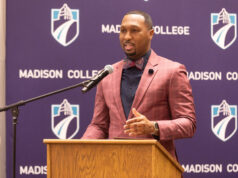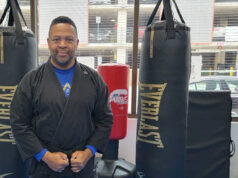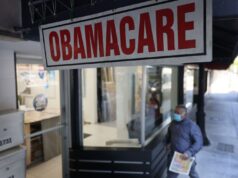“It’s one of the most amazing events that you will ever attend,” says Michelle Heitzinger, executive director of the South Central Wisconsin Affiliate of the Susan G. Komen Race for the Cure. “We have so many people who come to this event who don’t do races because, ultimately, this isn’t really a race. It’s an event. It’s a day to remember the people who we have lost to breast cancer and a day to celebrate those who are here.”
Thousands will convene on Willow Island of the Alliant Energy Center this Saturday, June 4, to support breast cancer survivors at the Susan G. Komen Race for the Cure, the world’s largest fundraising event for breast cancer. It consists of a series of 5K runs and fitness walks to raise money for breast cancer, to raise awareness of the disease, to celebrate those who have survived breast cancer, and memorialize those who have not.
Participants can register as individuals right up until race morning. Whole Foods, for the 19th year, will be a sponsor providing food at the event.
Except for skin cancer, breast cancer is the most common cancer among women in the U.S. About 1 in 8 U.S. women (about 12 percent) will develop invasive breast cancer over the course of her lifetime. In 2016, an estimated 246,660 new cases of invasive breast cancer are expected to be diagnosed in women in the U.S., along with 61,000 new cases of non-invasive (in situ) breast cancer. But there is hope. Thanks to heightened awareness, early detection, improved treatment methods and increased access to breast health services, people have a greater chance of survival than ever before.
“Sadly, however, about a third of our ladies who are cancer-free now will eventually have a recurrence,” Heitzinger tells Madison365. “This year, we have something new. At the finish line, your medal will say ‘Survivor’ or ‘Forever Fighter’ on it. So far, we’ve had about 30 gals register as Forever Fighters.

A Forever Fighter is someone battling stage IV or metastatic breast cancer that has spread to their bones, liver, lungs and/or brain. Currently, there is no cure for metastatic breast cancer. Men and women with this diagnosis are in a battle for the rest of their life, unless a cure is found.
“These women don’t feel like they’ve been in the category of survivor because they won’t ever be a survivor. It’s really bringing to light that there’s a hard-and-fast reality of this disease, too,” Heitzinger says. “We at Komen have taken criticism over the years for saying that we wrap this disease up in a little pink bow and send ladies on their way and that couldn’t be further from the truth. We all know the devastation of this disease. And you do always look over your shoulder and wonder if it can come back again.”
Susan G. Komen for the Cure was founded on a promise between two sisters, Susan Goodman Komen and Nancy Goodman Brinker. Komen was diagnosed with breast cancer in 1978, a time when little was known about the disease and it was rarely discussed in public. Before she died at age 36, Suzy asked her sister to do everything possible to bring an end to breast cancer. Nancy kept her promise by establishing the Susan G. Komen Breast Cancer Foundation in 1982.
Thirty-four years later, the Komen Foundation is a global leader in the fight against breast cancer and is the world’s largest private funder of breast-cancer research and community outreach programs. Their vision is to save lives and end breast cancer forever by empowering people and ensuring quality care for all and energizing science to find the cures.
The Komen Race for the Cure Series raises significant funds and awareness for the fight against breast cancer, celebrates breast-cancer survivorship, and honors those who have lost their battle with the disease. The Susan G. Komen Foundation’s Komen Race for the Cure sends 25 percent of the funds it raises to national and international Susan G. Komen breast cancer research grants and award programs
“What makes us truly unique in the breast cancer space but also truly unique for the major charities that are here in Madison – 75 percent of what is raised here, stays here,” Heitzinger says. “And it has to be used to fund gaps in breast health and breast cancer services primarily for uninsured and low-resource women.”

For example, the current 2016-2017 Susan G. Komen grantees include:
◆ The Komen Treatment Access Fund at the Department of Public Health Madison and Dane County, covering breast health and breast cancer services not covered by the Wisconsin Well Woman Program. The bilingual Spanish coordinator for Dane and Rock counties is funded by this Komen grant.
◆ The UW Hospital Breast Center- Navigation and Patient Support Services. This grant funds the breast health navigators in Dane and Rock County. These navigators work directly with the case managers of the Komen Treatment Access Fund and WI Well Woman Program
◆ The Catholic Multicultural Center provides breast cancer education and support in the Dane County Latino Community. This programming is conducted in Spanish and also works in conjunction with the Komen Treatment Access Fund and the Komen-funded bilingual coordinator and the WI Well Woman Program
Heitzinger says that the 8-county area that Komen serves is pretty white and overall pretty insured. “If you are not white and if you are not insured, it’s a huge struggle,” she says. “And we just look at it through the breast cancer lens. But we know that if it’s that difficult through our breast cancer lens, than it’s that difficult for any other malady that you are dealing with.”

Due to a wide variety of factors, many of them media-related, breast cancer has come to be seen as a “white womens’ disease.” Studies have shown that when African-American women follow the same preventive measures as white women, their death rates from breast cancer are very similar. However, African-American women are more likely than white women to be diagnosed at later stages of the disease and are more likely to die from it. Often, there’s a problem of people not understanding preventive care. The local Komen affiliate has been active in working to lessen those disparities for years.
“We really have gotten great coverage in the African American community especially with fantastic women like Frances Huntley-Cooper and Gloria Ladson-Billings. They’ve put themselves out there locally as the face of black women surviving breast cancer,” Heitzinger says. “Gloria will be honored by our Komen affiliate this year – she has been a survivor for 25 years now!”

Statistics show that overall, when African American women are diagnosed, they have larger tumors and their breast cancer has spread further (e.g. to the lymph nodes and to other parts of the body). This is unfortunate, because when breast cancer is discovered at more advanced stages, it is more difficult to treat and survival rates are lower.
“We also have Erin McCullough, who is doing the Mt. Zion [Baptist Church] team, and is trying to get 105 people to sign up for the Race For The Cure team this year,” she adds. “They all have done such a great job of getting information out there and if anybody is fearful or unsure or has questions about breast cancer, that those women are hooked up with us.”
Heitzinger points out that the Komen grant they have at the Catholic Multicultural Center on Madison’s south side is complete breast health and breast cancer programming in Spanish. “It’s also the only breast cancer support group for Spanish speakers that we can find in our 8 counties,” she says. “We have made huge inroads with our Latino communities.”

Heitzinger wants people to know that breast cancer diagnosis can be a scary thing, but it’s not a death sentence. The more information that you know about it, the better off you will be. The annual Susan G. Komen Foundation’s Race for the Cure is a fun starting point to learn more and to meet new friends.
“I hope people come out to the Race For The Cure event because it’s a fun time but also because money raised here, stays here,” Heitzinger says. “It’s helping all people in our community. That 75 percent [raised from the event] stays right here and that other 25 percent goes to the Komen Headquarters and national and international research.
“It’s a very, very special day. We celebrate the survivors and Forever Fighters,” she adds, “and we raise funds so that the next women who hears she has breast cancer will have health and services in this community and we will have the research that hopefully some day will find the causes and cures for this disease.”

